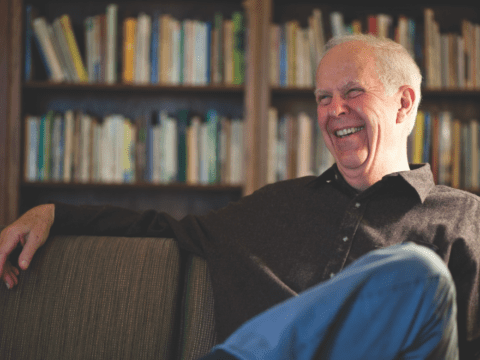When I was a girl, I tended to take on a lot of household responsibility and was overly conscientious at school, so some people called me “little Miss Perfect.” I knew at the time I was far from perfect in any sense of the word.
As commonly understood, when we say someone is perfect, we mean that they approximate an ideal we all know no one can really emulate. This negative kind of perfectionism is at the root of a deep malaise in western culture, tied to the myth of infinite perfection of the material world and of our status within it. Unfortunately, Jesus’ words in Matthew, “Be perfect, as your Heavenly Father is perfect,” have been taken out of context and misapplied.
It was not until 1656 that the word was defined in the theological sense as “the notion that moral perfection may be attained in earthly existence.” And it was not until 1934 that “a perfectionist” came to mean “one only satisfied with the highest standards.”
If we take Jesus’ words seriously in Matthew, some might think perfection is a matter of gritting your moral teeth and loving a person who let you down or injured you; God will heap blessings on your head for going against your natural impulse to express anger.
Perfectionism is rampant in our culture. Young girls, and increasingly boys, ingest media images of unhealthy thinness and struggle with anorexia. Moms and dads become workaholics, communicating with each other mostly through email in the quest for “perfect” careers.
Invariably, the quest is futile. We end up burdened with a sense of falling short, always “missing the mark” (itself an older Greek definition of “sin” or error). We sense that things are running down, time is running out and that despite all our best efforts, as Bob Dylan put it, “Everything is broken.”
What about fields such as art and athletics, where perfectionism seems entirely appropriate? If he didn’t strive for excellence, Michelangelo wouldn’t have lain on his back for years inscribing breath into Adam on the Sistine Chapel roof.
Surely there is a distinction between pushing the boundaries for the love of the art or sport, and pushing them for fame, approval and applause. Great artists and athletes don’t lose sight of the joy of creation or the activity’s intrinsic pleasure. If they do, they lose their greatness.
Maybe the kind of perfectionism that spoils both art and life is the kind that rejects the transitory and limited. Great artists know, as poet Wallace Stevens hints, “The imperfect is our paradise.” Leonard Cohen gets it right when he sings, “There is a crack in everything; that’s how the light gets in.”
However much we affirm what Stevens calls the “blessed rage for order,” the universe as we know it is not a neat and tidy place.
Greatness happens when we open ourselves to the grand unfathomable chaos that envelops our little orderings. God’s kitchen is a fecund mess that ends in a festive banquet. Our plots and plans go askew as newness invades. Perhaps heaven is not a topiary garden but a rain forest with falling trees, rotting nurse logs and the mysterious activity of microbes.
IN THE PASSAGE FROM MATTHEW and throughout the Bible, the word “perfection” has rich connotations. In Aramaic, the language of Jesus, the word “perfect” (gmar) is closer to “ripe,” “fully flavoured,” “fully flowered” — that is, a fulfilment of the potential a thing has had within itself from the start. In Latin, the word means “completely formed or performed,” and the verb “to perfect” means “to bring to full development.” The older Hebrew word for perfect, taman, means something close to “mature,” “whole,” “complete.”
Often we use the word to indicate a quality, but in these older contexts it is an action, a dynamic process to which we surrender. We know we cannot bring about this maturity by ourselves, but must enter the larger stream that is a fluid, balancing and integrating creation. Perfection could be redefined, then, as opening to the flow of the whole, which is the flow of divine Love.
What Jesus might have meant, then, is that to love perfectly is to integrate “the enemy” into oneself. This involves befriending ourselves and living from a felt sense of our deep inter-connectedness with others. If we redefine the term this way, then loving the enemy might begin to issue from the heart without so much moral strain, and the enemy we are called to love could be ourselves.
Perhaps in the end, being called to perfection requires some striving but much more letting go. There are common usages of the word “perfect” that seem perfectly fitting. A dog lolling on a lawn, for instance, is perfect because he is completely at one with the moment and is not being anything other than himself. The birds of the air and the lilies of the field are perfect, as Jesus observed, because they naturally let life ripple through and complete them. When the French say a meal is parfait, they mean it is completely satisfying and right. Maybe another way of putting it is that if you want to enter the cosmic dance that increases the amount of love in the universe, anywhere you are along the way to the end can be “right” and in harmony.
It is helpful to look at Jesus, then, not as one who was “perfect” in the static sense, but as one who, like us, was birthed through a process of transformation. In fact, the belief that Jesus was the “perfect” lamb who died for our sins is wrong-headed because it denies the love and compassion of God and our direct access to the fountains of mercy. The doctrine of atonement implies that God cannot forgive sinful humans except through a blood sacrifice. These harmful notions of Christian perfectionism are deeply rooted in the doctrine (developed in the 11th century by Bishop Anselm) of Jesus as the “perfect” sacrifice.
One last thought about the movement toward what has been called our “perfecting in the glory,” because humans need to be intentional about the pursuit of wholeness. Much more than “perfectionism” is at stake when Jesus tells the rich young ruler he needs to give away everything and follow him if he wants to be “perfect” and inherit eternal consciousness. Anyone who intentionally desires a spiritual path realizes that there are stages of development. The top of the mountain isn’t the only “perfect” place to be: there is also the beauty and rightness in the path itself.
In the end, the process of “perfecting in the glory,” then, may not require “perfectionism,” but a simple opening of the heart to the hidden wholeness within us.
***
This story first appeared in The United Church Observer’s June 2008 issue with the title “The problem with perfect.”















